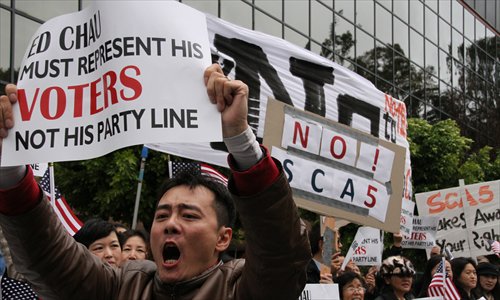HOME >> WORLD
Anger grows over education amendment
By Sun Weichi and Du Liya Source:Global Times Published: 2014-3-6 17:53:01

More than 500 Chinese-Americans gather on February 28 in front of the office building of state assembly member Ed Chau, urging Chau to vote against SCA5 in the state assembly. The amendment was proposed by state senator Ed Hernandez, and aimed to repeal Proposition 209, thus allowing preferential treatment in education for certain minorities. Photo: Yu Yan
Hundreds of Chinese-Americans in Southern California gathered recently to express their outrage against SCA 5, the controversial proposed amendment to the California constitution which would potentially decrease Asian-American students' chances of being admitted into top public universities, despite the efforts of some legislators to mitigate community anger.
The amendment, authored by state Democratic senator Ed Hernandez, would allow the state to give preferential treatment in public education and employment to groups based on race, sex, color, ethnicity or national origin. It aims to boost education for certain minorities, such as blacks and Latinos. If SCA5 is passed in the state assembly, it will be presented to voters statewide.
Under mounting pressure from the Asian-American community, three Chinese-American state senators who voted for the amendment during the January 30 state senate meeting, including Leland Yee, Ted Lieu and Carol Liu, communicated with Hernandez last week, hoping that the initiative could be held from the state assembly.
"Prior to this vote, we heard no opposition to this bill. However, in the past few weeks, we have heard from thousands of people throughout California concerned about SCA 5," said the three Chinese-American state senators in a press release dated February 27. "We have asked Senator Hernandez to hold SCA 5 until he has an opportunity to meet with affected communities and attempt to build a consensus," they said.
A spokesperson from Hernandez' office stressed that it is "a very slow process" before SCA5 can be put on the ballot for Californians to vote upon.
"He is not pushing anything or making anything going fast forward right now. He wants to give time for not only the Chinese community to be heard, but as well as everyone, all the stakeholders," said the spokesperson.
Meanwhile, more actions have been taken by Asian-Americans to stop SCA5 from being passed in the state assembly.
More than 500 Chinese-Americans gathered in the rain on February 28 in front of the office building of state assembly member Ed Chau, protesting against SCA5 and labelling it as "Skin Color Act 5". They urged Chau to vote against SCA5 in the state assembly. Chau promised at the gathering that he would not vote yes.
At a press conference organized on the same day by Daniel H Deng, a renowned lawyer in Southern California who launched an anti-SCA5 alliance, Republican state assembly member Curt Hagman said that SCA5 would lead the state in the wrong direction. California has experienced a good period of educational growth thanks to Proposition 209, but the new proposal would hamper the state's edge in education, he added.
Bob Huff, Republican leader in the state senate, said that it is almost impossible for Hernandez to "hold" SCA5 as it has been approved by state senate.
Gino Kwok and Joseph Chang, board members of the Hacienda La Puente Unified School District, agreed with Hagman, saying that if SCA5 is passed, top universities would have to set up cram courses for students who are not academically qualified but admitted into the universities based on their race.
Asian-American students now have to get a 4.28 GPA score to get into top universities such as UCLA, while students of other races often need only 3.7 for the same school, said Andrew Kuo, director of the ACI Institute, adding that SCA5 would create new educational unfairness for Asian-American students.
SCA5 sends a warning to Asian immigrants who work hard by themselves to improve their quality of life in the US, said a mother who drove with a group of Chinese-American mothers from Orange County to participate the protest. "Working hard is far from enough. Only when Chinese immigrants participate more in politics can our core interests be better protected," she said.
Posted in: